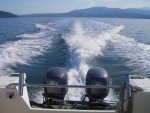breausaw
New member
- Joined
- Jan 18, 2006
- Messages
- 1,222
- Reaction score
- 0
- C Dory Year
- 2007
- C Dory Model
- 25 Cruiser
- Vessel Name
- Triple J
Here we go again.
Should be exciting to see how this all plays out, hopefully no loss of life or damage to the environment but things can get mighty messy out there.
http://www.adn.com/2010/12/03/1586105/c ... t-off.html
Another argument for twins, or a really big kicker.
I’m sure they will drop the hook, but that only slowed down the last cargo ship that washed ashore in the same area a few years back; you would think dropping anchor would keep them into the weather even if its just dragging through water.
Should be exciting to see how this all plays out, hopefully no loss of life or damage to the environment but things can get mighty messy out there.
http://www.adn.com/2010/12/03/1586105/c ... t-off.html
Another argument for twins, or a really big kicker.
I’m sure they will drop the hook, but that only slowed down the last cargo ship that washed ashore in the same area a few years back; you would think dropping anchor would keep them into the weather even if its just dragging through water.

